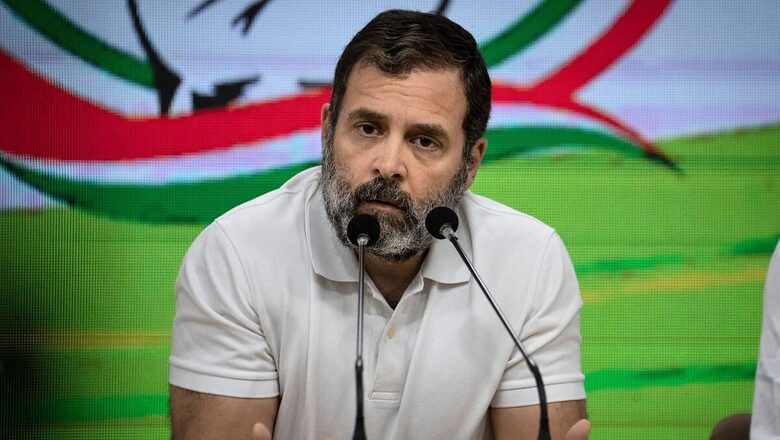
views
Former Congress president Rahul Gandhi has moved the Supreme Court against Gujarat high court’s July 7 order denying a stay on his conviction. The urgent mentioning request will be made on Tuesday before a bench headed by Chief Justice DY Chandrachud.
Pronouncing its verdict in Modi surname case, the Gujarat high court had said that if the judgment is not stayed, it would lead to throttling of free speech, free expression, free thought, and free statement.
Gandhi in his appeal said if the high court verdict is not stayed it would contribute to the systematic, repetitive emasculation of democratic institutions and the consequent strangulation of democracy which would be gravely detrimental to the political climate and future of India.
His appeal said, “It is most respectfully submitted that if the impugned judgment is not stayed, it would lead to throttling of free speech, free expression, free thought, and free statement. It would contribute to the systematic, repetitive emasculation of democratic institutions and the consequent strangulation of democracy which would be gravely detrimental to the political climate and future of India.”
Gandhi said that the error of convicting him for the statement and refusal of stay of conviction has been perpetuated three times and it is all the more reason that the top court should interfere and stymie the damage at the earliest.
Gandhi added that firstly, an undefined amorphous group which, according to the complainant consists of 13 crore people, has been held to be defamed. “The surname Modi in different parts of the country encompasses different communities and sub-communities, which usually have no commonality or uniformity at all”, his appeal said.
He further added, secondly, the three specific persons named in the speech, who alone could have possibly suffered prejudice, have admittedly not sued or complained and instead, the complainant simply has a ‘Modi’ surname from Gujarat who has neither shown nor been held to be prejudiced or damaged in any specific or personal sense.
“Thirdly, the complainant admitted that he comes from Modh Vanika Samaj. This term is not interchangeable with Modi and the Modi surname is present in various castes,” the 731-page appeal said.
Raising questions, Gandhi said, “It is not only curious but extremely significant, indeed sinister, that all earlier cases including all qua the present speech, have been filed by members and office bearers of the ruling party. It is ironic that the only persons allegedly defamed out of a supposed defined community of 13 crore persons are those who are office bearers or senior personnel of the ruling Bharatiya Janata Party (BJP).”
The Congress leader was disqualified as a Member of Parliament on March 24, 2023 after a Gujarat court convicted him and sentenced him to a two-year imprisonment on charges of criminal defamation for comments he made about the Modi surname. In a setback to the 53-year-old Gandhi, the high court dismissed his petition for a stay on conviction on July 7, observing that “purity in politics” is the need of the hour.
A stay on Gandhi’s conviction could have paved the way for his reinstatement as a Lok Sabha MP but he failed to get any relief from either the sessions court or the Gujarat High Court. On July 7 itself, BJP MLA Purnesh Modi, the complainant in the defamation case against Gandhi, filed a caveat in the top court seeking that he be heard if the Congress leader moves a plea challenging the high court verdict refusing to stay his conviction in the case.
A caveat is filed in an appellate court by a litigant seeking an opportunity of being heard before any order is passed on the appeal of an opponent challenging the order or judgment of the court below. Purnesh Modi, a former minister in the Gujarat government, had filed a criminal defamation case in 2019 against Gandhi over his “How come all thieves have Modi as the common surname?” remark made during an election rally at Kolar in Karnataka on April 13, 2019.
A metropolitan magistrate’s court in Surat had on March 23 sentenced the former Congress president to two years in jail after convicting him under Indian Penal Code (IPC) sections 499 and 500 (criminal defamation). Following the verdict, Gandhi, elected to the Lok Sabha from Wayanad in Kerala in 2019, was disqualified as an MP under the provisions of the Representation of the People Act.
Gandhi then challenged the order in a sessions court in Surat along with an application seeking a stay on his conviction. While granting him bail, the sessions court on April 20 refused to stay the conviction, following which he had approached the high court.
(With inputs from PTI)
















Comments
0 comment